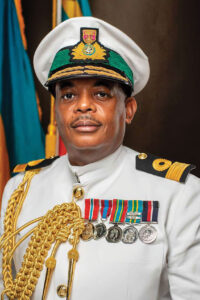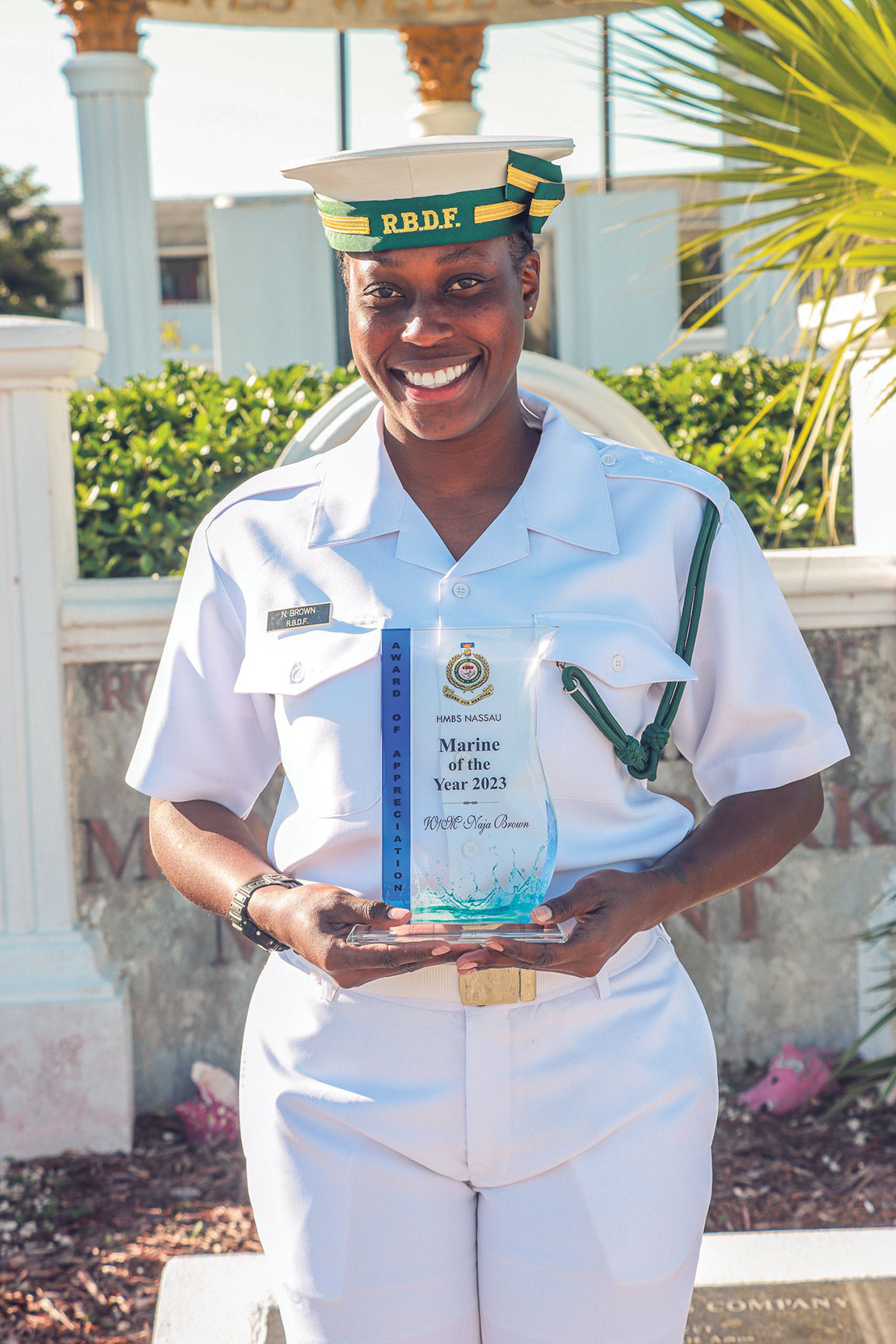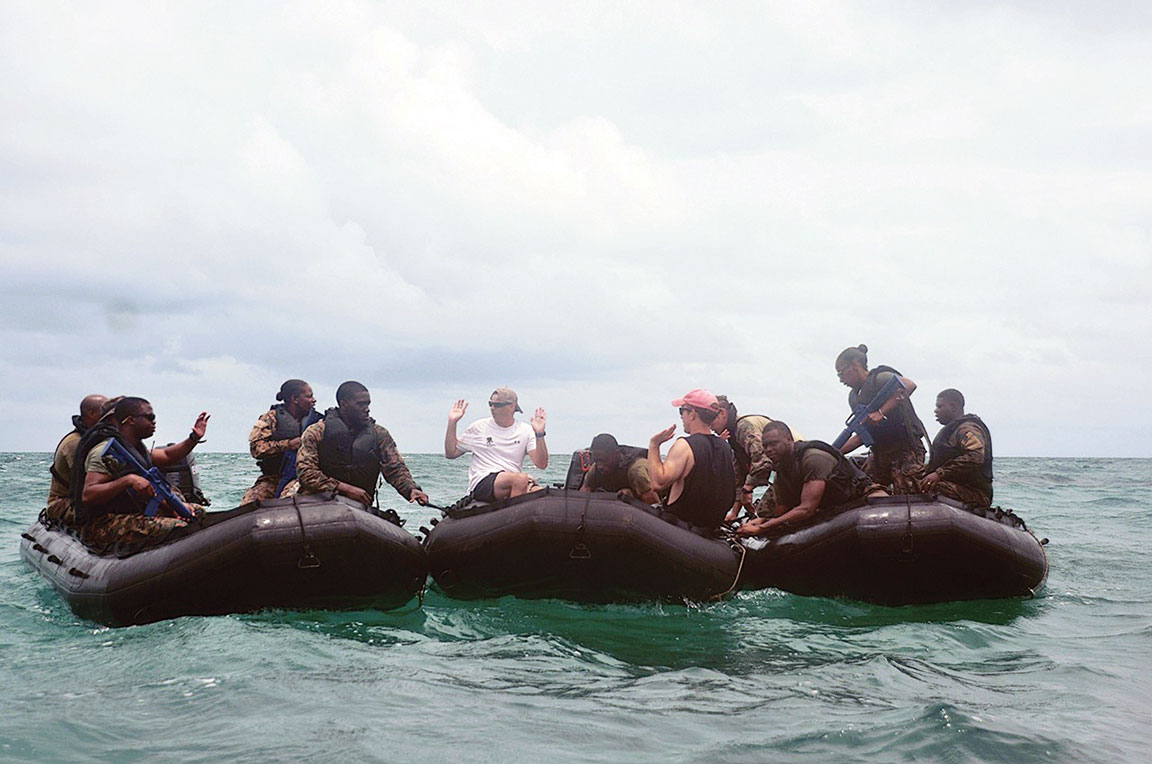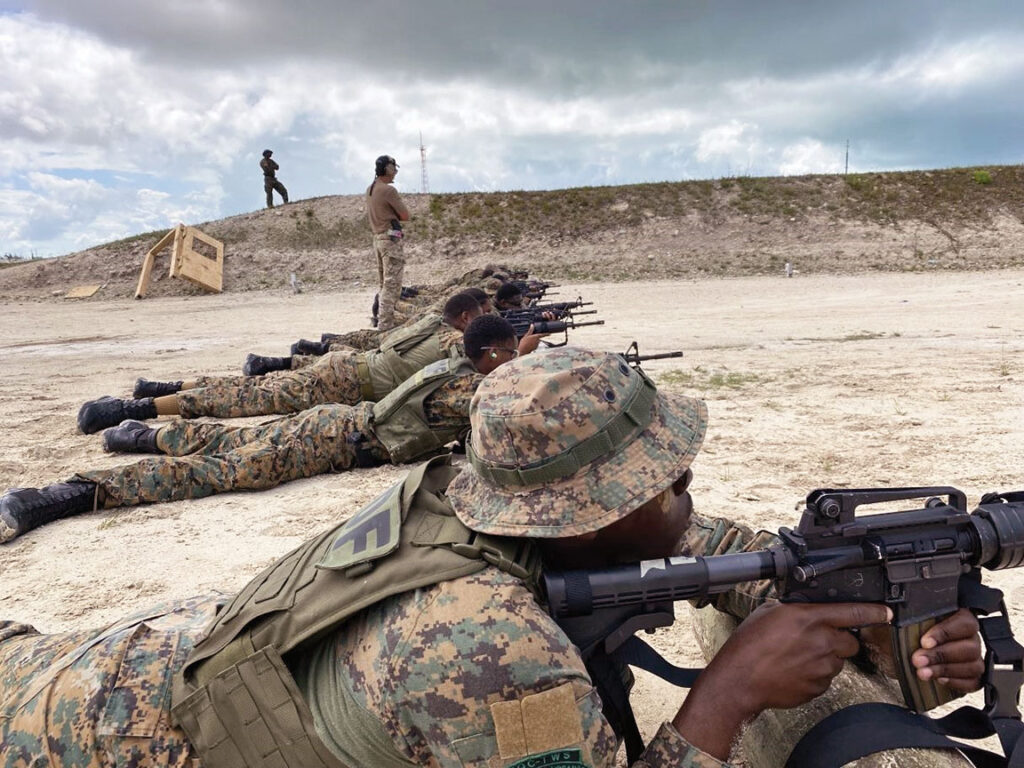Members of the U.S. 20th Special Forces Group (Airborne) observe Royal Bahamas Defence Force members as they display their marksmanship skills on a range in Nassau, Bahamas. U.S. SPECIAL OPERATIONS COMMAND NORTH
THE WATCH STAFF

Commodore Raymond E. King became the commander of the Royal Bahamas Defence Force (RBDF) in May 2020. As a critical U.S. partner in the Caribbean, the force protects its own homeland while helping guard critical approaches to the U.S. King agreed to discuss his goals for the force in areas ranging from workforce development and gender optimization to international peacekeeping missions.
THE WATCH: As the eighth commander of the Royal Bahamas Defence Force, what is your vision for the RBDF and what changes have you made over the last three years?
COMMODORE KING: Our vision is to develop a high-performance, professional workforce focused on excellence. We want to create an organization with certified professionals who are research-focused and results-oriented to create and sustain the organizational agility required in a dynamic security environment.
In terms of restructuring, we have decentralized our operations with organizational branches and regional commands. We have established a Crisis Risk Management Unit with emphasis on mass casualty incidents and internal crisis and a Health and Safety Unit to address occupational safety concerns. We also have created a Morale, Welfare and Recreational Unit, established the Veterans Affairs Office, and incorporated the Junior Rates Mess, a program that provides social and recreational activities for personnel.
To improve operational efficiency, we have continued to develop the Drone (UAV) Academy as a regional center of excellence and are working toward accreditation for our legacy leadership and training programs into a Maritime and Military Academy (center of excellence). We are also developing a Search and Rescue Coordination Centre (potential center of excellence) and are digitizing our processes.
As for policy implementation, we are striving to achieve gender optimization by making sure the principles of the Women, Peace and Security program are institutionalized. We also are implementing policies for uniform accessories worn by RBDF reserves, veterans and retirees.
Infrastructure upgrades and fixed asset acquisition are areas of continued focus. We are installing marine surveillance systems on HMBS Coral Harbour and HMBS Gunn Point at Ragged Island and are establishing a Cybersecurity Unit. The RBDF is also procuring four Safeboats, simulators for damage control and firefighter training, and we are working on infrastructure development plans at several bases.
THE WATCH: What led to your decision to join the RBDF and serve your country?
COMMODORE KING: I was influenced by an uncle who was a member of the RBDF at the time of the unfortunate attack and sinking of HMBS Flamingo on May 10, 1980. That solidified my interest, determination, and drive to join the RBDF.

THE WATCH: What are the biggest threats to the Bahamas and how is the RBDF countering these threats?
COMMODORE KING: Transnational criminal networks (illicit drug trafficking; small arms and light weapons trafficking; illegal, unregulated and unreported fishing; irregular migration; people trafficking, etc.). In particular, the proliferation of illegal weapons is linked to more than 90% of the homicides and violent crimes in the Bahamas.
Climate change and natural disasters (frequency and intensity of hurricanes due to the impact of climate change) have caused billions of dollars in infrastructure losses and many deaths.
Cybersecurity risks have emerged as a major threat to our economy due to the increasing use of cyber and digital technologies for most transactions crossing multiple industries, government agencies, public and private sectors. Countermeasures include strengthening security cooperation relationships with regional, hemispheric and international partners as force multipliers while building internal capacities and military capabilities. For instance, our security cooperation with U.S. Northern Command (USNORTHCOM), U.S. Southern Command (USSOUTHCOM) and the U.S. State Department includes key leader engagements, subject matter expert exchanges, equipment donations and multiagency amphibious exercises.
Likewise, the use of bilateral and multilateral agreements with regional partners like Operation Bahamas Turks and Caicos (OPBAT) involving the Bahamas, Turks and Caicos Islands and the U.S., is guided by the Northern Caribbean Security Summit/Framework and helps the Bahamas’ response to illicit drug trafficking and unsafe migration.

THE WATCH: How do you view the military relationship between the Bahamas and the United States? What are its strengths? In what areas can we work better together?
COMMODORE KING: The security cooperation relationship between the Royal Bahamas Defence Force and the United States remains strong and vital to the national security of both countries. In fact, deepening the relationship remains a national security objective of the government of the Bahamas as articulated to the RBDF and sister law enforcement agencies.
Moreover, the Bahamas is considered a third border of the United States along with Mexico and Canada. Border control and protection is critical to the safety, security, stability and prosperity of all concerned nations, particularly the United States. Specifically, the strength of the existing relationship lies in our bilateral relations. This relationship is further strengthened by trilateral and multilateral agreements with neighboring countries toward safeguarding the sovereignty and territorial integrity of all concerned.
THE WATCH: The Bilateral Security Cooperation Framework (BSCF) between the United States and the Bahamas identifies areas of mutual interest. What are the key successes of this initiative?
COMMODORE KING: Success indicators of the BSCF consist of the enhancement of existing military capabilities and expanding capacities of the RBDF. For instance, under the domain awareness line of effort, the organization’s communications capabilities have been enhanced significantly, led by the installation of strategic maritime surveillance systems (coastal radar) on Ragged Island in support of HMBS Gunn Point operations.
This, along with improved satellite-based communications systems, affords critical redundancies to meet the organization’s primary, alternate, contingent, and emergency requirements for ongoing maritime operations, search and rescue (SAR) operations and humanitarian assistance and disaster relief (HADR) events.
Similarly, improved intelligence and cybersecurity capabilities are being achieved through mission effectiveness and operational efficiencies. More importantly, the continued implementation of cyberspace countermeasures and professional development of our staff in the Cyber Security Department is deeply valued.
Additionally, under the domain control line of effort, the upgraded SAR capabilities through the donation of SAROPS technology, hardware, installation and training with available support will assist tremendously toward the realization of the joint (maritime and aviation) SAR Rescue Coordination Centre and the Centre of Excellence for the Caribbean region.
Under the institutional capability-building effort, the continued emphasis on improved HADR capabilities through the National Emergency Management Agency and the RBDF cannot be overstated given the frequency and intensity of tropical storms.
In summary, the RBDF by means of its security cooperation relationship with the U.S. has during the past four years stemmed the flow of irregular migration to our shores, deterred illegal, unreported and unregulated fishing on its major fishing banks, and mitigated the flow of illicit drugs and associated small arms and light weapons smuggling at sea.

THE WATCH: How has the acquisition of Maritime Surveillance Systems throughout the Bahamian (Lucayan) archipelago improved overall domain awareness?
COMMODORE KING: The installation of the Maritime Surveillance Systems (coastal radars) in Great Inagua (HMBS Matthew Town) and at New Providence (HMBS Coral Harbour) has translated into significant gains and operational successes particularly against illegal migration toward Nassau and Great Inagua/Turks and Caicos Islands.
The coastal defense systems have eradicated the flow of Haitian migrants to New Providence, which is a problem that had plagued the country for decades with unbearable socioeconomic effects. Likewise, evasive traditional migration toward the Turks and Caicos and migration movements west off Great Inagua toward Castle Island and Crooked Island has forced such vessels westward to the Old Bahama Channel and the northern coast of Cuba in efforts to avoid detection and eventual detention.
THE WATCH: Why is it important to decentralize the RBDF’s forces? How will decentralization make your forces more resilient? What are the challenges and opportunities to decentralization?
COMMODORE KING: Decentralized operations are essential for the Bahamas and the RBDF given the nation’s archipelago (wide expanse of inhabited and remote islands), extensive maritime domain covering 342,990 square kilometers, and often unguarded ports of entry.
More specifically, the economic efficiency and operational effectiveness of decentralized operations cannot be overstated versus centralized operations accompanied by logistical challenges. Hence, the opportunity to realize extended operational endurance (surface and aerial patrols) and area of operations coverages will undoubtedly afford enhanced domain awareness and domain control capabilities with efficient/economical operations. However, challenges are expected with sustained logistical supply constraints at remote locations away from HMBS Coral Harbour and Grand Bahama.
THE WATCH: The Bahamian government has publicly pledged forces for peacekeeping in Haiti. How is this effort progressing?
COMMODORE KING: The RBDF continues its planning and preparation for the eventual deployment to Haiti. Thus far, theoretical classes have been conducted by Canadian Forces, and integrated training will follow in Jamaica.
Additionally, train-the-trainer peacekeeping training for instructors took place in Argentina and Chile in April 2024. Likewise, equipment, materials and supplies have been carefully identified and requested from the United States to ensure mission success in Haiti.
THE WATCH: The RBDF has fully endorsed gender integration under the Women, Peace, and Security program. What is the RBDF doing to transform the force to be 30% female?
COMMODORE KING: The Royal Bahamas Defence Force has been deliberate in demonstrating gender equality organizationally via policies, procedures, and processes. For example, conscientious efforts are made to ensure that decisions on promotions, advancements, appointments, training and development, decision-making (participatory management) among others reflect at a minimum the percentage of women employed in the workplace.
Whereas regional forces employ an average of 14-16% female employees; the Royal Bahamas Defence Force has a ratio of 18.5%. We have worked on an effort to recruit at least 30% women over the past three years.
THE WATCH: What is your vision for the future of the RBDF? How can the U.S. Department of Defense (DOD) support this vision?
COMMODORE KING: The strategic vision for the RBDF is a military establishment led and staffed by a team of expert officers and Marines who are highly productive and who emphasize the application of best practices using advanced technology while continuously improving military capabilities and processes toward refined mission effectiveness and operational efficiency.
To accomplish this vision requires critical levels of security cooperation assistance from the U.S. Department of Defense to ensure that as a third border of the United States, the RBDF is professionally trained, equipped and continually developed as a force multiplier to its DOD efforts thus ensuring the security, safety and prosperity of both nations.

